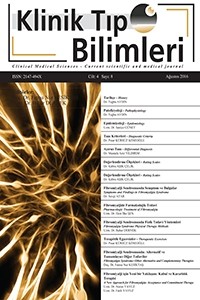Obez Hastalarda Tip 2 Diyabet Tedavisi
Obezite, tip 2 diyabet, tedavi
Type 2 Diabetes Treatment in Obese Patients
Obesity, type 2 diabetes, treatment,
___
- Kaynaklar 1.IDF Diabetes Atlas. 7th ed2015. 2.Satman I, Omer B, Tutuncu Y, Kalaca S, Gedik S, Dinccag N, et al.Twelve-year trends in the prevalence and risk factors of diabetes andprediabetes in Turkish adults. European journal of epidemiology.2013;28(2):169-80. 3.Malin SK, Kashyap SR. Type 2 Diabetes Treatment in the Patient withObesity. Endocrinology and metabolism clinics of North America.2016;45(3):553-64. 4.Knowler WC, Barrett-Connor E, Fowler SE, Hamman RF, LachinJM, Walker EA, et al. Reduction in the incidence of type 2 diabeteswith lifestyle intervention or metformin. The New England journalof medicine. 2002;346(6):393-403. 5.UK Prospective Diabetes Study 7: response of fasting plasma glu-cose to diet therapy in newly presenting type II diabetic patients,UKPDS Group. Metabolism: clinical and experimental.1990;39(9):905-12. 6.Lim EL, Hollingsworth KG, Aribisala BS, Chen MJ, Mathers JC, Tay-lor R. Reversal of type 2 diabetes: normalisation of beta cell func-tion in association with decreased pancreas and liver triacylglyce-rol. Diabetologia. 2011;54(10):2506-14.7.American Diabetes A. 7. Obesity Management for the Treatment ofType 2 Diabetes. Diabetes care. 2017;40(Suppl 1):S57-S63. 8.Goldstein DJ. Beneficial health effects of modest weight loss. Inter-national journal of obesity and related metabolic disorders : jour-nal of the International Association for the Study of Obesity.1992;16(6):397-415. 9.Pastors JG, Warshaw H, Daly A, Franz M, Kulkarni K. The eviden-ce for the effectiveness of medical nutrition therapy in diabetes ma-nagement. Diabetes care. 2002;25(3):608-13. 10.Tuomilehto J, Lindstrom J, Eriksson JG, Valle TT, Hamalainen H,Ilanne-Parikka P, et al. Prevention of type 2 diabetes mellitus by chan-ges in lifestyle among subjects with impaired glucose tolerance. TheNew England journal of medicine. 2001;344(18):1343-50. 11.Houmard JA, Tanner CJ, Slentz CA, Duscha BD, McCartney JS, Kra-us WE. Effect of the volume and intensity of exercise training on in-sulin sensitivity. Journal of applied physiology. 2004;96(1):101-6. 12.Look ARG. Eight-year weight losses with an intensive lifestyle inter-vention: the look AHEAD study. Obesity. 2014;22(1):5-13. 13.Look ARG, Wing RR, Bolin P, Brancati FL, Bray GA, Clark JM, et al.Cardiovascular effects of intensive lifestyle intervention in type 2 dia-betes. The New England journal of medicine. 2013;369(2):145-54. 14.Wing RR, Goldstein MG, Acton KJ, Birch LL, Jakicic JM, Sallis JF,Jr., et al. Behavioral science research in diabetes: lifestyle changesrelated to obesity, eating behavior, and physical activity. Diabetescare. 2001;24(1):117-23. 15.Venditti EM, Bray GA, Carrion-Petersen ML, Delahanty LM,Edelstein SL, Hamman RF, et al. First versus repeat treatment witha lifestyle intervention program: attendance and weight loss outco-mes. International journal of obesity. 2008;32(10):1537-44. 16.Diabetes Prevention Program Research G. Long-term effects of li-festyle intervention or metformin on diabetes development and mic-rovascular complications over 15-year follow-up: the Diabetes Pre-vention Program Outcomes Study. The lancet Diabetes & endocri-nology. 2015;3(11):866-75. 17.Davies MJ, Bergenstal R, Bode B, Kushner RF, Lewin A, Skjoth TV,et al. Efficacy of Liraglutide for Weight Loss Among Patients WithType 2 Diabetes: The SCALE Diabetes Randomized Clinical Trial.Jama. 2015;314(7):687-99. 18.Wadden TA, Hollander P, Klein S, Niswender K, Woo V, Hale PM,et al. Weight maintenance and additional weight loss with liraglu-tide after low-calorie-diet-induced weight loss: the SCALE Mainte-nance randomized study. International journal of obesity.2013;37(11):1443-51. 19.Liu SC, Tu YK, Chien MN, Chien KL. Effect of antidiabetic agentsadded to metformin on glycaemic control, hypoglycaemia and we-ight change in patients with type 2 diabetes: a network meta-analy-sis. Diabetes, obesity & metabolism. 2012;14(9):810-20. 20.Monami M, Nardini C, Mannucci E. Efficacy and safety of sodiumglucose co-transport-2 inhibitors in type 2 diabetes: a meta-analy-sis of randomized clinical trials. Diabetes, obesity & metabolism.2014;16(5):457-66. 21.Bailey CJ, Gross JL, Pieters A, Bastien A, List JF. Effect of dapag-liflozin in patients with type 2 diabetes who have inadequateglycaemic control with metformin: a randomised, double-blind, pla-cebo-controlled trial. Lancet. 2010;375(9733):2223-33. 22.DeFronzo RA, Tripathy D, Schwenke DC, Banerji M, Bray GA, Buc-hanan TA, et al. Pioglitazone for diabetes prevention in impaired glu-cose tolerance. The New England journal of medicine.2011;364(12):1104-15. 23.TEMD Obezite LM, Hipertansiyon Çalışma Grubu. Obezite Tanı veTedavi Kılavuzu. Ankara2016. 24.Garvey WT, Ryan DH, Look M, Gadde KM, Allison DB, Peterson CA,et al. Two-year sustained weight loss and metabolic benefits with con-trolled-release phentermine/topiramate in obese and overweight adults(SEQUEL): a randomized, placebo-controlled, phase 3 extensionstudy. The American journal of clinical nutrition. 2012;95(2):297-308. 25.Torgerson JS, Hauptman J, Boldrin MN, Sjostrom L. XENical in theprevention of diabetes in obese subjects (XENDOS) study: a rando-mized study of orlistat as an adjunct to lifestyle changes for the pre-vention of type 2 diabetes in obese patients. Diabetes care.2004;27(1):155-61. 26.O'Neil PM, Smith SR, Weissman NJ, Fidler MC, Sanchez M, ZhangJ, et al. Randomized placebo-controlled clinical trial of lorcaserinfor weight loss in type 2 diabetes mellitus: the BLOOM-DM study.Obesity. 2012;20(7):1426-36. 27.Hollander P, Gupta AK, Plodkowski R, Greenway F, Bays H, BurnsC, et al. Effects of naltrexone sustained-release/bupropion sustained-release combination therapy on body weight and glycemic parame-ters in overweight and obese patients with type 2 diabetes. Diabe-tes care. 2013;36(12):4022-9. 28.Brethauer SA, Aminian A, Romero-Talamas H, Batayyah E, Mackey J,Kennedy L, et al. Can diabetes be surgically cured? Long-term meta-bolic effects of bariatric surgery in obese patients with type 2 diabetesmellitus. Annals of surgery. 2013;258(4):628-36; discussion 36-7. 29.Ribaric G, Buchwald JN, McGlennon TW. Diabetes and weight incomparative studies of bariatric surgery vs conventional medical the-rapy: a systematic review and meta-analysis. Obesity surgery.2014;24(3):437-55. 30.Schauer PR, Bhatt DL, Kirwan JP, Wolski K, Brethauer SA, Nava-neethan SD, et al. Bariatric surgery versus intensive medical therapyfor diabetes--3-year outcomes. The New England journal of medi-cine. 2014;370(21):2002-13.
- ISSN: 2147-494X
- Başlangıç: 2013
- Yayıncı: Selen Medya Yayıncılık Tanıtım ve Organizasyon Hizmetleri
Pregestasyonel Diyabeti Olanlarda Rehberlik, Tedavi ve İzlem
Diabetes Mellitus’ta Tıbbi Beslenme Tedavisi İlkeleri
Metabolik Cerrahi Sonrası DiyabetliHastanın Beslenmesi
Yrd. Doç. Dr. Dyt. Nihal Zekiye ERDEM
Gastrointestinal Sistem Otonom Nöropatinin Tanı ve Tedavisi
Çocuk ve Adolesanlarda Tip-2 Diyabetin Tanısı ve Yönetimi
Diyabetli Hastalarda Egzersiz Reçetesi
Diabetes Mellitus’ta Hiperlipidemi ve Hipertansiyon Tedavi İlkeleri
Tip 1 Diyabetli Bir Hastanın Tedavi veİzlemindeki Püf Noktaları
İnsülin Direnci İçin Pratik Değerlendirme Yöntemleri ve Yaklaşım
